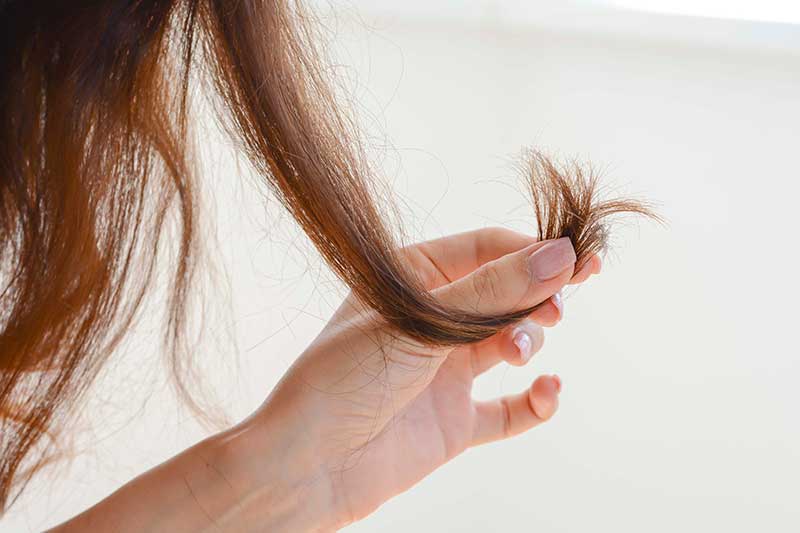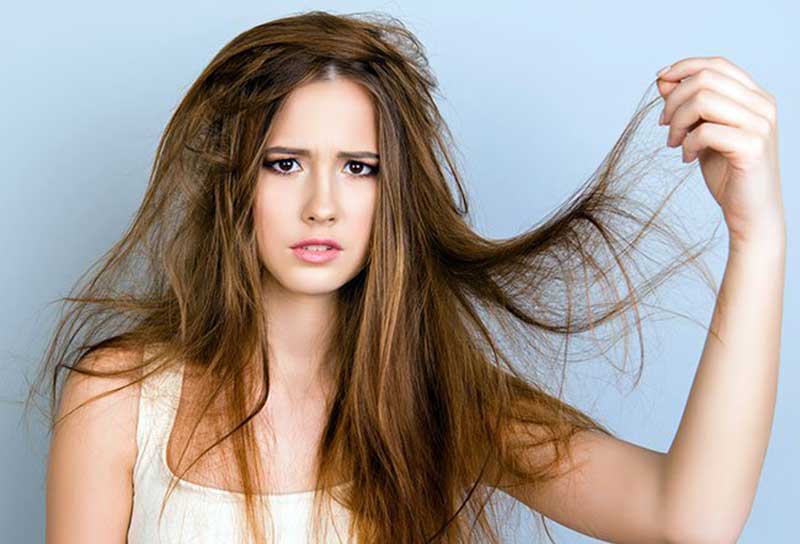Dry hair can be a frustrating and common problem that many individuals face. It not only affects the appearance of your hair but can also lead to various other hair-related concerns. Understanding the causes of dry hair is essential to effectively manage and improve its condition. In this article, opposingdigits will explore the common causes of dry hair, its effects, prevention, treatment options, natural remedies, and when to seek professional help.
Introduction
Having lustrous, healthy-looking hair is often desired, but dry hair can make it seem like an unattainable goal. Dry hair lacks moisture and natural oils, leaving it brittle, dull, and prone to damage. It can occur due to several factors, both internal and external. By identifying these causes, you can take appropriate steps to address them and restore your hair’s health and vitality.
Understanding Dry Hair
Before delving into the causes of dry hair, it’s important to understand the structure of our hair. Each strand of hair consists of three layers: the medulla, cortex, and cuticle. The cuticle, the outermost layer, acts as a protective barrier. When the cuticle is damaged or lacks moisture, the hair becomes dry, fragile, and more susceptible to environmental stressors.

Common Causes of Dry Hair
Environmental Factors
Exposure to environmental factors plays a significant role in the health of our hair. Excessive exposure to sunlight, wind, and dry air can strip away the natural moisture from our hair, leading to dryness. Additionally, living in areas with low humidity levels can also contribute to dry hair.
Heat Styling Tools
Regular use of heat styling tools like flat irons, curling irons, and blow dryers can cause dryness in the hair. The high temperatures from these tools can deplete the moisture content, making the hair brittle and parched. Over time, frequent heat styling can lead to long-term damage.
Overwashing and Harsh Shampoos
Washing your hair too frequently and using harsh shampoos can strip away the natural oils that keep the hair hydrated. Harsh chemicals and sulfates found in some shampoos can be particularly drying to the hair and scalp. It is important to choose gentle, moisturizing shampoos and limit hair washing to every two to three days.
Chemical Treatments
Chemical treatments such as perming, relaxing, or coloring can cause significant damage to the hair, leading to dryness. These treatments often involve the use of strong chemicals that break down the hair’s protein structure and moisture balance. It is crucial to follow proper aftercare routines and use nourishing products to minimize the drying effects.
Nutritional Deficiencies
Nutrition plays a vital role in the health of our hair. Deficiencies in essential nutrients like vitamins, minerals, and proteins can contribute to dryness. Inadequate intake of nutrients such as vitamin E, biotin, iron, and omega-3 fatty acids can affect the overall quality and moisture balance of the hair.
Genetics
Genetics can also predispose individuals to dry hair. Some people naturally produce less sebum, the natural oil that moisturizes the hair. As a result, their hair tends to be drier and more prone to dryness-related issues.
Effects of Dry Hair
Dry hair can have several negative effects on its appearance and overall health. It’s important to be aware of these effects to understand the significance of addressing dryness.
Frizziness and Flyaways
One of the common effects of dry hair is increased frizziness and the presence of flyaways. The lack of moisture causes the hair shaft to become rough and porous, leading to an unruly appearance.
Breakage and Split Ends
Dry hair is more prone to breakage and split ends due to its weakened structure. The lack of moisture and essential oils weakens the hair shaft, making it susceptible to damage and breakage.
Dull and Lackluster Appearance
Dry hair often lacks shine and appears dull and lifeless. Without proper hydration, the cuticle remains open, reflecting less light and diminishing the hair’s natural luster.
Difficulties in Styling
Styling dry hair can be challenging as it lacks flexibility and manageability. It may resist holding curls or styles, making it difficult to achieve desired looks.

Prevention and Treatment
Preventing and treating dry hair involves adopting healthy hair care practices and making lifestyle adjustments. Here are some strategies to consider:
Moisturizing Hair Care Products
Using moisturizing shampoos, conditioners, and hair masks can help replenish the moisture levels in your hair. Look for products that contain ingredients like glycerin, shea butter, or natural oils, which provide hydration and nourishment.
Limiting Heat Styling
Reducing the frequency of heat styling and using heat protectant products can minimize damage and dryness caused by high temperatures. Embracing heatless styling methods like air drying or heat-free curling techniques can also be beneficial.
Gentle Cleansing and Conditioning
Opt for gentle shampoos that do not strip the hair of its natural oils. Conditioning regularly and using leave-in conditioners can help restore moisture and improve the hair’s texture.
Protective Hairstyles
Wearing hairstyles that protect the ends of your hair, such as braids or buns, can shield them from environmental stressors and reduce moisture loss. Additionally, using silk or satin pillowcases and avoiding tight hair ties can prevent friction and breakage.
Balanced Diet and Hydration
A balanced diet rich in vitamins, minerals, and proteins promotes overall hair health. Ensure you’re consuming foods like salmon, nuts, leafy greens, and eggs that provide essential nutrients. Additionally, staying hydrated by drinking an adequate amount of water supports hair hydration from within.

Natural Remedies for Dry Hair
In addition to commercial hair care products, natural remedies can be effective in restoring moisture to dry hair. Here are some commonly used remedies:
Coconut Oil
Coconut oil has moisturizing properties that can help hydrate and soften dry hair. Apply warm coconut oil to your hair, focusing on the ends, and leave it on for a few hours or overnight. Rinse it out thoroughly, and repeat this treatment regularly.
Argan Oil
Argan oil is rich in antioxidants, fatty acids, and vitamin E, making it a popular choice for dry hair. Apply a few drops of argan oil to damp hair, starting from the mid-lengths to the ends. It provides hydration, reduces frizz, and adds shine.
Avocado
Mash a ripe avocado and mix it with a tablespoon of olive oil or honey to create a nourishing hair mask. Apply the mixture to your hair, leave it on for 30 minutes, and rinse thoroughly. Avocado provides essential nutrients and natural oils to moisturize dry hair.
Aloe Vera
The gel from aloe vera leaves is known for its soothing and moisturizing properties. Apply fresh aloe vera gel directly to your hair and scalp, leave it on for 30 minutes, and rinse. It helps restore moisture balance and promotes healthy hair growth.
Apple Cider Vinegar
A diluted solution of apple cider vinegar can be used as a final rinse after shampooing to restore the hair’s pH balance. Mix one part apple cider vinegar with two parts water and pour it over your hair. Leave it on for a few minutes, then rinse thoroughly.
Seeking Professional Help
If your dry hair persists despite your efforts to address it, it may be beneficial to consult a professional hair stylist or dermatologist. They can assess your hair’s condition, identify underlying causes, and recommend specific treatments or products tailored to your needs.
Conclusion
Dry hair can be caused by various factors, including environmental influences, heat styling tools, overwashing, chemical treatments, nutritional deficiencies, and genetics. It can lead to frizziness, breakage, dullness, and styling difficulties. By adopting preventive measures like using moisturizing products, limiting heat styling, and embracing protective hairstyles, you can improve the condition of your hair. Natural remedies such as coconut oil, argan oil, avocado, aloe vera, and apple cider vinegar can also provide hydration and nourishment. Remember, if your dry hair persists or worsens, seeking professional advice is recommended to identify any underlying issues and receive appropriate treatment.
FAQs
Can dry hair be reversed?
While complete reversal of dry hair may not be possible, adopting proper hair care practices, using moisturizing products, and following a balanced diet can significantly improve its condition and hydration levels.
How often should I wash my hair if it’s dry?
For dry hair, it is generally recommended to wash your hair every two to three days to prevent stripping away the natural oils that keep it moisturized.
Are there any home remedies for dry hair?
Yes, there are several home remedies for dry hair, including coconut oil, argan oil, avocado, aloe vera, and apple cider vinegar. These natural ingredients can provide moisture and nourishment to dry hair.
Can stress cause dry hair?
Stress can indirectly contribute to dry hair by disrupting hormonal balance and affecting overall health. Stress-related behaviors like excessive hair pulling or twisting can also damage the hair shaft, leading to dryness and breakage.
Can dry hair lead to hair loss?
Dry hair alone may not directly cause hair loss, but it can weaken the hair shaft, making it more susceptible to breakage. If hair breakage is severe, it can give the appearance of hair loss. Proper hair care and addressing dryness can help minimize breakage and preserve the hair’s density.













